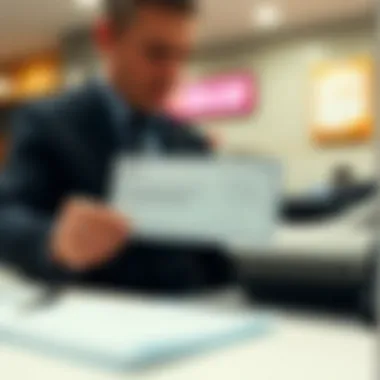Cashing a Check Without a Bank Account: A Guide


Overview of the Topic
Cashing a check at a bank when you do not have an account can be a bit of a pickle. In today's fast-paced financial environment, many individuals find themselves in situations where they need to convert a check into cash without the benefit of a bank account. This scenario often raises questions about the methods available and the requirements involved. Understanding this process can be essential not just for convenience, but also for avoiding unnecessary fees and complications.
Cashing a check without having an account can be crucial for those who may not have easy access to traditional banking services. Whether it’s a paycheck, a personal check from a friend, or a payment for services rendered, knowing how to cash it can save time and frustration. This matter is also relevant to individuals navigating temporary financial challenges or those who utilize alternative financial services. By orienting oneself to the necessary steps and strategies, individuals can effectively manage their finances even without a banking relationship.
Key Benefits and Implications:
- Access to Funds: Successfully cashing a check ensures you have immediate access to your funds, which can be vital for day-to-day expenses.
- Avoiding Fees: Understanding the right banks and strategies can help minimize or avoid any potential fees.
- Empowerment: Gaining knowledge on this topic can empower individuals to manage their finances proactively.
Exploring Strategies and Tips
When it comes to cashing a check without an account, there are specific strategies you can utilize that can make the process smoother. Here are a few practical tips you can consider:
- Identify Suitable Banks: Not all banks will cash a check for non-account holders, so it's smart to research which ones do. Many national banks like Chase or Bank of America might have policies in place that allow this.
- Prepare Your Identification: Having valid identification matters a lot. Often, a government-issued ID such as a driver’s license or a passport is required.
- Check Their Policies: Each bank has different protocols, so understanding their specific requirements can save you time. Some may have limits on check amounts or charge a percentage of the check.
For those who often find themselves cashing checks, it may also be helpful to establish a good relationship with a local bank or credit union. Check with them regarding their policies on cashing checks for non-account holders.
Case Studies and Examples
One instance that illustrates this process well was experienced by a friend of mine. He received a personal check as payment for work done but didn’t have a bank account. Instead of choosing an unfamiliar bank, he opted to go to a local credit union where he had previously received service for cashing checks. He was able to cash the check without hassle after presenting his ID and paying a minor fee. This demonstrates the importance of utilizing recognized financial institutions with favorable policies.
Conversely, another friend encountered difficulties at a big-name bank. Without prior knowledge of their strict regulations, he faced frustration when they refused to cash his check due to administrative policies. This highlights the necessity of knowing in advance what to expect when heading to a bank.
Comparison of Financial Products
When considering how to cash a check, exploring various financial services can be helpful. Below are common options that one might consider:
- Banks: Many banks may offer check-cashing services, albeit often with a fee for those without an account.
- Check-Cashing Services: These specialized services charge fees that can range from a flat rate to a percentage of the check value, but they are typically convenient.
- Retail Stores: Some retail outlets, like Walmart, offer check-cashing services with lower fees compared to standalone check-cashing businesses.
Pros and Cons
- Banks:
- Check-Cashing Services:
- Retail Stores:
- Pros: Reliable and secure.
- Cons: Often higher fees for non-account holders.
- Pros: Fast and simple process.
- Cons: Can be expensive depending on the check amount.
- Pros: Affordable options available.
- Cons: Limited to specific amounts and types of checks.
Expert Insights and Recommendations
Financial experts advise that before cashing a check, it’s wise to call ahead and confirm the requirements and fees of your chosen institution.
Furthermore, they recommend maintaining a good record of the checks you’ve cashed in the past to avoid any potential mishaps or rejections. Keeping track of your financial transactions, regardless of how you manage them, empowers you to make better decisions in the future.
Considering these insights and the plight of cashing checks without an account, individuals can take control of their finances and avoid unnecessary complications in their dealings.
Prelims to Cashing Checks without an Account
Cashing a check without having a bank account might feel like navigating a maze. While it may seem a bit tricky, knowing the ins and outs can turn this process into a straightforward task. Many people find themselves in situations where they receive checks but lack an account, either due to personal choices, financial constraints, or simply because they haven't yet opened one. Understanding how to cash a check in this scenario becomes a crucial skill.
Not everyone is aware that various institutions, including some banks and check-cashing services, can help you get your money without necessitating a bank account. The importance of comprehending this process cannot be overstated. It’s not just about getting cash in hand; it influences your financial flexibility and empowers you to manage your funds effectively.


By familiarizing yourself with the methods and requirements related to cashing checks, you're not just learning about a single financial transaction. You’re taking a step toward greater financial independence. This understanding fosters confidence, enabling you to handle fiscal matters even when traditional banking isn't part of the equation. Let’s dig into the core concepts to see what’s required to navigate these waters.
Types of Checks You Can Cash
When it comes to cashing checks without a bank account, understanding the various types of checks that are eligible for cashing is crucial. Each type of check has its own benefits and considerations, which can significantly impact the ease with which one can obtain cash. Knowing the distinctions among personal checks, cashier's checks, and government checks can empower individuals to navigate this process effectively, even in the absence of a conventional banking relationship.
Personal Checks
Personal checks are probably the most common type that people will encounter. These are essentially written orders from one individual to their bank, instructing the bank to pay a specific amount from their account to another party. The key point to remember here is that personal checks can be less reliable, as they depend on the check writer, who must have sufficient funds in their account to cover the amount.
- Verification Process: Banks usually conduct a verification process before cashing personal checks. This means they might call the issuer's bank to confirm the funds are available. Therefore, if the check is from a friend or family member, it's essential to ensure they have enough money in their account.
- Endorsement: You need to endorse the check on the back before cashing it. Without proper endorsement, the bank will not process it.
- Fees Involved: It's worth noting that banks may charge a fee for cashing personal checks, especially if you're not an account holder. Therefore, it’s wise to inquire about potential fees beforehand.
Cashier's Checks
A cashier's check is a more secure option compared to personal checks. This type of check is issued by a bank and is drawn against the bank’s own funds rather than an individual's account. Because of this, they generally carry a higher level of assurance for cashing, making them a favored option for significant transactions.
- Guaranteed Funds: One of the standout features of a cashier's check is that it’s backed by the bank, ensuring that the money is guaranteed as long as the check does not show signs of being fraudulent. This characteristic often makes it easier to cash.
- Endorsement Requirements: Similar to personal checks, you’ll need to endorse the back before cashing it. Just like in the case of personal checks, lacking an endorsement will halt the transaction.
- Fees: While some banks might cash cashier's checks for non-account holders without a fee, others may apply a charge. Inquiring ahead of time could save you a headache.
Government Checks
Government checks, which can include tax refunds or social security payments, are typically viewed as highly reliable means of payment. They are issued by federal or state entities, providing an added assurance for banks willing to cash them.
- High Reliability: Since these checks are from the government, they are often cashable at most banks without complications. Their legitimacy is generally unquestioned, allowing easier access to funds.
- Identification Requirements: Banks often require valid identification when cashing government checks, especially for non-account holders. Ensure to bring appropriate ID to facilitate the process.
- Fees: Although some banks might not charge for government checks, others may do so depending on their policies. It pays to clarify any fees before heading to the bank.
In summary, knowing the types of checks that can be cashed without an account can greatly simplify the process of obtaining funds. Each category has its own set of characteristics, verification processes, and potential fees, necessitating careful thought and preparation before attempting to cash a check. By understanding these nuances, individuals can better navigate their financial transactions.
Requirements to Cash a Check
Cashing a check without a bank account can feel overwhelming. There are certain requirements one must meet to make the process smooth. Understanding these essentials is not only important for a successful transaction but also empowers individuals to navigate their finances effectively. Meeting these requirements can open up opportunities rather than hindering access to cash.
Valid Identification Needed
To cash a check, presenting valid identification is a must. Most banks will require some form of ID to verify your identity. A government-issued photo ID, such as a driver’s license or passport, typically suffices. Some banks might also accept employee IDs or military IDs. It’s wise to ensure the ID is not expired—having an up-to-date one is crucial.
Different states can have varying laws on this, so it’s beneficial to check local regulations. In some cases, banks may specifically ask for more than one form of identification, so it’s helpful to carry copies of documents like utility bills or other official paperwork that links back to your name and address.
Endorsement of the Check
Endorsing the check is another necessary step in cashing it. This basically means signing the back of the check to acknowledge that you're transferring ownership. It’s important to ensure that your endorsement matches the name on the front of the check. If it's a personal check, you might see a line for your signature right next to a statement that says "Pay to the Order Of."
One thing to keep in mind is that some banks could require additional information, such as your phone number or account number, even if you do not have an account with them. It's always a good practice to inquire beforehand about specific endorsement requirements to avoid surprises.
Check Specifications
Lastly, knowing the check specifications can save you time and headache. Not all checks are created equal. For instance, checks should be printed on certain types of paper to be valid. Make sure the check is not ripped, faded, or otherwise damaged, as this could lead to complications. Also, look out for checks that are stale-dated (generally checks older than six months) or post-dated (checks dated for a future date) as they often won’t be honored by banks.
If a check fails to meet these basic specifications, the bank may decline to cash it, emphasizing the importance of understanding what a valid check entails. It might be helpful to take a closer look at the check’s details before heading to the bank to make sure everything is in proper order. This diligence can potentially save you time and frustration.
"Having valid ID, a proper endorsement, and an undamaged check can turn a stressed situation into a hassle-free process."
In summary, by being well-prepared with the necessary requirements, individuals can facilitate the check-cashing journey without an account. It truly pays off to know these details, as not every bank operates the same way or may have hidden pitfalls.
Bank Policies on Non-Account Holders


Cashing a check without a bank account can be a nuanced task, contingent on the policies of individual banks. Understanding these policies is fundamental, not just for successful cashing but to avoid unpleasant surprises. Each financial institution has its standards, and being informed can mean the difference between a smooth transaction and a frustrating experience.
Understanding Different Banks
Not every bank operates under the same guidelines. Big banks may have stringent rules compared to local or community banks. For instance, Chase Bank often cashes checks for non-account holders under specific conditions, while Wells Fargo might decline certain checks based on their age or total value. Additionally, regional banks may display more flexibility.
It's useful to do some homework prior to stepping inside. Usually, banks have detailed information on their check cashing policies available online. You can often find this on their official websites. It's also worth asking friends or family which local banks they interact with, as there’s a good chance they have insights that could work to your advantage.
Fees Associated with Cashing Checks
One of the most important aspects to consider is the potential fee associated with cashing. Banks commonly charge a fee for cashing checks for non-account holders. This can vary widely.
- Flat Fees: Some banks, like Bank of America, might charge a flat fee ranging from $5 to $10.
- Percentage Fees: Others could charge a percentage of the check’s amount, especially if it’s a sizable check. For example, TD Bank may apply a 1% fee on checks above a certain dollar threshold.
- Exemptions: Make sure to check if the bank waives fees under certain conditions, like checks issued by the government, or if they offer promotional days when fees are reduced or eliminated.
It’s crucial to be prepared for these costs as they can chip away at your overall cash-in-hand. Don’t take financial surprises lightly.
Daily Limits on Cashing
On top of fees, banks often have restrictions on the dollar amount you can cash per day. This is essential to keep an eye on, especially if you often receive larger checks. For instance:
- Bank of the West might allow only up to $2,500 per day for non-customers.
- SunTrust Bank can set a limit at $1,000.
These limits can be frustrating for someone needing quick cash but may vary based on the check type. Always ask when you arrive at the bank; they’ll provide clarity on what you can cash and what limitations exist.
"Always read the fine print; the devil’s in the details, especially when it comes to your finances."
Understanding these aspects of bank policies will keep you one step ahead in managing your financial transactions. You can check various bank resources here to help pinpoint the right options for cashing checks without an account.
Alternative Options for Cashing a Check
Cashing a check without a bank account can be a conundrum for many individuals. However, understanding the alternative options available ensures that you can access your funds promptly and with minimal hassle. This section delves into various methods to achieve this goal, examining the specific benefits and considerations for each alternative.
Check Cashing Services
Check cashing services have sprung up across the country, providing a handy solution for those without a banking relationship. These services operate independently and can cash checks for a fee, which is often a percentage of the check amount.
- Pros:
- Cons:
- Convenience: Typically, check cashing services don't require extensive documentation. You usually need a valid ID and the check itself.
- Accessibility: Many check cashing outlets are found in convenience stores and dedicated shops, making them easier to find than traditional banks.
- Fees: The charges can eat into the funds you are trying to access. Be aware that the fees vary from one provider to another.
- Potential Scams: Not all services have a stellar reputation. Always check reviews or ask for recommendations before proceeding.
Retail Outlet Cashing
Many large retail chains, such as Walmart and certain grocery stores, now offer check cashing services. This can be an excellent option as it combines the act of cashing a check with other shopping needs.
- Pros:
- Cons:
- Low Fees: Retailers often have lower fees compared to standalone check cashing services, making this a budget-friendly option.
- Ease of Use: You can complete the cashing process during your regular grocery or shopping trips, keeping everything under one roof.
- Check Limits: Some stores impose limits on the amount they will cash. Typically, personal checks may not exceed a certain threshold.
- Longer Wait Times: Depending on the store's foot traffic, you might find yourself waiting in line longer than at a bank branch.
Mobile Wallet Transfers


As technology evolves, so does the way we handle money. Mobile wallet services like PayPal, Venmo, or Cash App have introduced features allowing users to deposit or cash checks using their smartphones.
- Pros:
- Cons:
- Speed: Once approved, funds can be available almost instantly, transferring directly to your mobile balance.
- Keep Track: These apps often provide a way to manage your funds efficiently, right from your pocket.
- Limits on Checks: Not all mobile wallets offer check cashing. You must ensure your app of choice provides this functionality.
- Fees: While some services charge nothing, others may take a cut from the funds or impose a flat fee for check deposits.
"When using alternatives to traditional banking, always compare options carefully and be aware of the fees and policies involved. Knowing this will give you the upper hand in financial transactions."
Understanding these various methods can empower individuals without bank accounts to access their funds efficiently. Whether you opt for a dedicated check cashing service, a retail outlet, or a tech-savvy mobile wallet transfer, knowing your options paves the way for easier financial management.
Considerations When Cashing a Check
When it comes to cashing a check without an account, there are several factors to keep in mind. This section unpacks the considerations that can affect how seamless the process is, and why it matters to be informed.
Sensitivity of Personal Information
One must recognize that when cashing a check, sensitive personal information is often required. This could include your name, address, and sometimes even your Social Security number. Banks and check cashing services need this information to verify your identity and ensure the legitimacy of the transaction.
"Protecting your identity is crucial; one slip-up can turn into a headache."
Furthermore, handing over this information can be unsettling. It is essential to only work with reputable banks or services. Research their practices regarding data protection. For instance, ask about how they handle your data post-transaction. Understanding their protocols can give you peace of mind while navigating this financial task.
Fraud Prevention Measures
In an age of digital transactions, the risk of fraud is ever-present. When cashing a check, especially as a non-account holder, be aware of potential scams. Always inspect the check thoroughly. Items like rubber stamps or strange watermarks can be red flags.
Additionally, some banks have specific fraud prevention measures for non-account holders. They may hold funds until the check clears, which can take several business days. It's wise to inquire about this when you approach a bank. Knowing the policies can guide you in making better choices. Also, if a check seems too good to be true, it probably is. Whether it’s an unexpected lottery win or a payment from a long-lost relative, exercise caution and employ due diligence.
Timing of Transactions
Timing plays a critical role when cashing a check. Some banks have specific hours for non-account holders or have higher fees during peak hours. If you're planning to cash a check, knowing when the bank is less busy can save you both time and money.
Moreover, consider the timing of your check itself. If it’s nearing its expiration date or you’re cashing it at the end of the week, plan for any potential delays. Some checks, like personal checks, may not clear as quickly. Understanding these aspects helps streamline the process and minimizes unwanted surprises.
Culmination
Cashing a check without a bank account may sound daunting at first, but this article demystifies the process. Understanding the steps involved, key requirements, and available options can empower individuals to handle their financial transactions more effectively. The importance of being informed cannot be overstated, especially in today’s fast-paced financial environment.
"Knowing your options is half the battle when it comes to financial empowerment."
Having a grasp of identification needs, potential fees, and varying bank policies means you can approach this task with confidence instead of trepidation. The journey ends with you feeling capable and aware, knowing that cashing a check is simply another part of navigating your financial landscape.
Recap of Key Points
In summation, there are crucial elements to remember when cashing a check without an account:
- Identification: Always carry valid ID when you approach a bank. This could be a driver’s license, passport, or any government-issued ID.
- Endorsement: Ensure you endorse the check correctly to avoid hiccups during processing.
- Fees: Different banks charge varying fees for cashing checks. Being aware of these can save you some dollars.
- Policies: Each bank has its own rules regarding cashing checks for non-account holders. Familiarize yourself with those before heading out.
Taking these points into consideration means being prepared and making informed decisions, thus paving the way toward successful transactions.
Empowering Financial Choices
Empowerment in financial dealings comes from knowledge and preparation. Choosing to understand the ins and outs of cashing checks is a vital step toward greater financial independence. With the right information, you can explore more flexible options like third-party cashing services or retail outlets.
When you find yourself needing to cash a check, you won’t feel cornered into a situation without options. Instead, you can approach the task with clear strategies in place and ultimately feel more in control of your financial fate.
In the end, becoming proficient in handling these everyday financial actions opens up avenues for better financial planning and decision-making in other areas, whether that’s saving for the future or pursuing investment opportunities.



